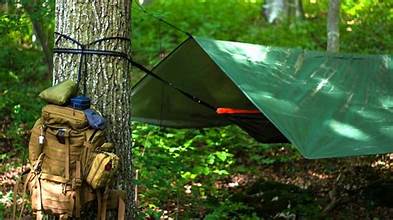Survival in the wild demands more than just luck and instinct; it requires a set of skills and knowledge that can be honed through certifications in bushcraft and survival. In this article, we will delve into the various certifications available, the skill levels they represent, and the importance of acquiring these qualifications for outdoor enthusiasts and adventurers.
Exploring Bushcraft
Understanding Bushcraft
Bushcraft is about thriving in the wilderness using primitive skills and minimal tools. It encompasses a wide range of abilities, including fire making, shelter building, and foraging. Certifications in bushcraft act as a compass, guiding individuals through the intricate terrain of survival knowledge. Embarking on the journey of bushcraft is an exploration into the art of survival and connection with the wild. Beyond mere skills, bushcraft is a philosophy, an intricate dance with nature that unfolds in various insights.
1. Primitive Skills Foundation
At the heart of bushcraft lies a foundation built on primitive skills—fire making, shelter building, and foraging. These fundamental skills are not just survival tactics; they are the essence of thriving in the wilderness.
2. Minimalist Tools, Maximum Efficiency
The essence of bushcraft lies in the art of achieving maximum efficiency with minimal tools. It’s a mastery of improvisation, where natural resources are transformed into invaluable assets in the hands of a skilled bushcrafter.
3. Nature as the Classroom
In bushcraft, the wilderness becomes a dynamic classroom. Here, observation, adaptation, and learning from nature’s cues are not just practices; they are the fundamental principles that guide the journey of mastering survival skills.
4. Holistic Approach to Survival
Bushcraft is not merely a collection of individual skills; it’s a holistic approach that encompasses a profound understanding of plants, animals, and terrain. This comprehensive knowledge ensures a well-rounded mastery of the art of survival.
5. Cultural and Historical Roots
Many bushcraft techniques carry deep cultural and historical roots. Understanding and embracing these traditions adds a layer of richness to the practice, connecting modern practitioners to the ancient wisdom of survival.
6. Adaptability in Any Environment
The mark of a skilled bushcrafter lies in the ability to adapt to diverse environments. Whether navigating a dense forest, traversing an arid desert, or conquering a snowy tundra, versatility is the key to mastering the art of bushcraft.
7. Mindset of Self-Reliance
Bushcraft instills a mindset of self-reliance. Practitioners learn not just to survive but to thrive, trusting their abilities and making resourceful decisions even in the most challenging and unpredictable situations.
8. Environmental Stewardship
At its core, bushcraft promotes a deep respect for the environment. Practitioners become advocates for sustainable practices, leaving minimal impact on the ecosystems they traverse and recognizing the delicate balance of nature.
9. Continuous Learning and Adaptation
The world of bushcraft is ever-evolving, and practitioners understand the importance of continuous learning. Staying updated on new techniques and adapting to changing conditions are essential aspects of mastering the intricate art of bushcraft.
10. Connection with Nature
Bushcraft Fundamentals
To navigate the wilderness, one must master the basics. Certifications at this level focus on foundational skills like creating fire from natural materials and constructing shelters from available resources.
Foraging Proficiency
Surviving in the wild involves sourcing food sustainably. Certifications in foraging teach individuals how to identify edible plants, ensuring they can sustain themselves in the wild.
Skill Levels and Certifications
Novice Survivalist
Novice survivalists start their journey with certifications designed to instill fundamental survival skills. These may include basic first aid, navigation, and setting up a safe campsite.
Navigation Mastery
A crucial skill in the wild is knowing where you are and where you’re going. Certifications focusing on navigation provide in-depth knowledge of map reading, compass use, and orienteering.
Survival First Aid
Accidents happen, even in the wild. Certifications in survival first aid equip individuals to handle emergencies, offering valuable skills in basic medical care when professional help is not immediately available.
Intermediate Wilderness Explorer
As individuals progress in their wilderness journey, intermediate certifications come into play. These focus on advanced shelter construction, fire-making techniques, and sustainable resource management.
Advanced Shelter Architecture
Intermediate survivalists learn to build sturdy shelters using natural materials, understanding the importance of insulation and protection against the elements.
Mastering Advanced Fire Craft
Survivalists at this level go beyond the basics of fire-making. They master the art of creating fire through friction and can start fires even in challenging weather conditions.
Beyond Survival
Expert Wilderness Nomad
The expert level is for those who seek to not only survive but thrive in the wilderness. Certifications at this level focus on extended solo survival and advanced foraging techniques.
Solo Survival
Surviving alone in the wild is an art. Certifications at this level teach individuals how to endure extended stays in the wilderness, developing not just physical but also psychological resilience.
Master Forager
Expert survivalists understand the importance of sustainable food sources. Master forager certifications delve deep into advanced plant knowledge and sustainable hunting practices.
Conclusion
In the unpredictable terrain of the wild, certifications and skill levels in bushcraft and survival act as a compass, guiding adventurers through the complexities of nature. Whether you’re a novice seeking fundamental skills or an expert aiming for mastery, these certifications not only enhance your survival capabilities but also foster a deep connection with the natural world. So, embark on this journey, earn your certifications, and unlock the door to a world where the wilderness becomes not just a challenge but a classroom for life’s most profound lessons.







